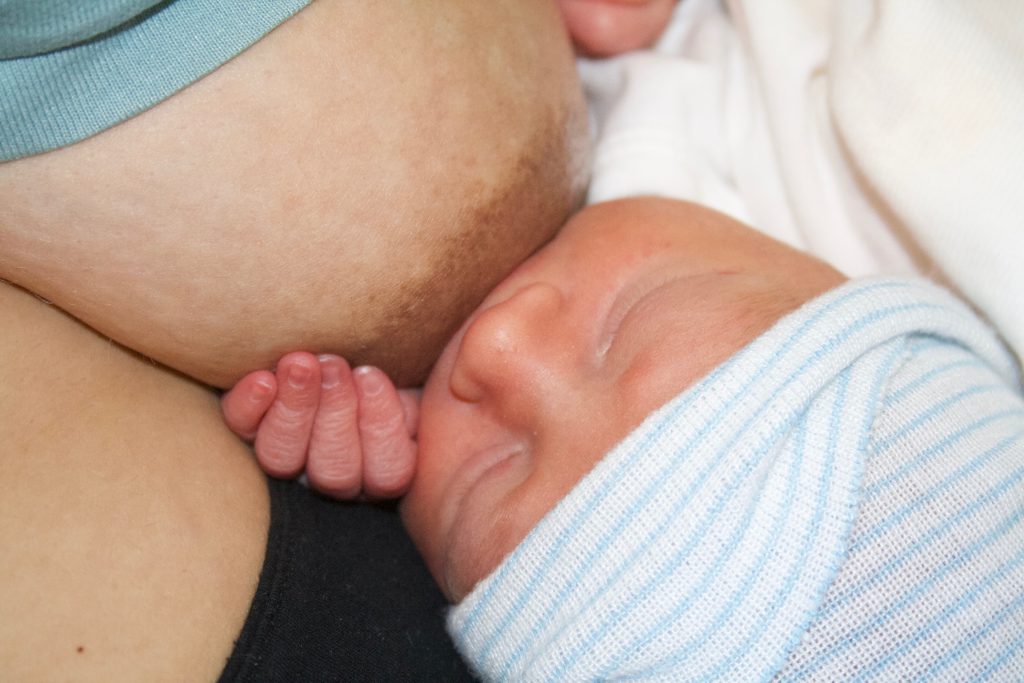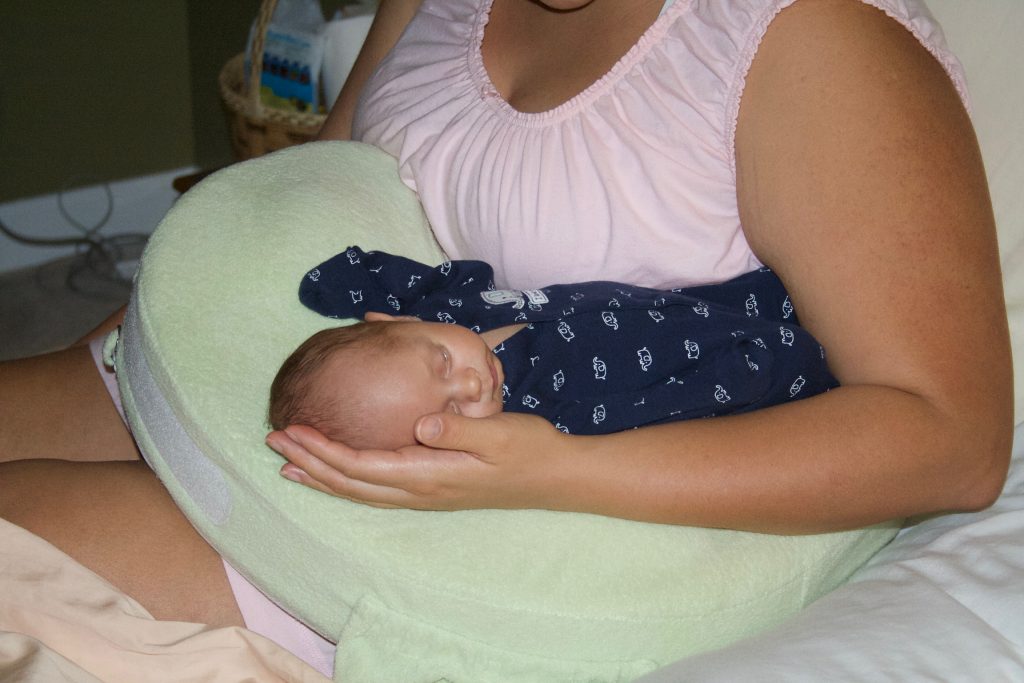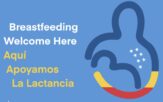Written by Durham Families



Things to know
- Remember to be kind to yourself. Breastfeeding is not as easy as I thought it would be. Took a lot of time and energy. But totally worth it. Good Luck!
- You can breastfeed, even if you plan to go back to work, you have a C-section, your baby is premature, or you have twins…even triplets!
- The more your baby nurses the more milk you will have. (Is Your Baby Getting Enough Milk Video from Global Health media)
- Newborns usually nurse 10 to 14 times in a 24-hour period.
- Babies nurse for nourishment and also for many other important reasons.
- Nap or rest with your baby when you can.
- Drink plenty of water.
- Talk with someone who has enjoyed nursing.
- It is okay to feel clueless when you get home
- Go to at least a couple of breastfeeding support meetings. Even if you don’t continue going, the “normalizing” experience of being around so many women breastfeeding was transformative for me – nobody averting their eyes or giving me weird stares, no anxious, awkward body mechanics required to keep others comfortable or feeling flashed, and no one bringing “too much” attention/focus on you as you try to breastfeed. At the same time, just by being there around others breastfeeding, you get to see all varieties of holds, techniques, babies who fuss and those who don’t (because sometimes it’s the baby who’s clueless, not you!), and if you do have questions or want help, people are kind and happy to offer it.
Videos
Global Health Media Breastfeeding Videos
During calamities, breastfeeding is a natural emergency response that mothers can immediately use. – Uploaded from Smart Parenting|BreezePhilippines Breastfeeding
Online and In Person Communities
- 4th Trimester Project
- reddit.com/r/breastfeeding,
- reddit.com/r/mommit
- reddit.com/r/breakingmom
- ‘joined at the nip’ Facebook
- meet up group, Alternative Parenting of Durham.
- Public Durham Facebook: https:// www.facebook.com/LLLofNCDurham/
- Private Durham Facebook: https:// www.facebook.com/groups/LLLofDurhamPM/
- Triangle Area Parenting Support: New parent support groups meet for 10 weeks. Groups are available for newborns and older babies in English and Spanish.
Medications & More During Pregnancy & Breastfeeding
MotherToBaby, a service of the non-profit Organization of Teratology Information Specialists, is dedicated to providing evidence-based information to mothers, families, and health care professionals about medications, herbal products, infections, vaccines, medical conditions, and other exposures during pregnancy and while breastfeeding. Read more.
View a fact sheet that answers frequently asked questions about medications and much more during pregnancy and breastfeeding. MotherToBaby Fact Sheets are available in both English and Spanish and can be downloaded for free.
Now in its 17th Edition, Medications and Mothers’ Milk, is the worldwide best selling drug reference on the use of medications in breastfeeding mothers. This book provides you with the most current, complete, and easy-to-read information on thousands of medications in breastfeeding mothers. This massive update has numerous new drugs, diseases, vaccines, and syndromes. It also contains new tables, and changes to hundreds of existing drugs. Read more.
LactMed
The LactMed® database contains information on drugs and other chemicals to which breastfeeding mothers may be exposed. It includes information on the levels of such substances in breast milk and infant blood, and the possible adverse effects in the nursing infant. Suggested therapeutic alternatives to those drugs are provided, where appropriate. All data are derived from the scientific literature and fully referenced. A peer review panel reviews the data to assure scientific validity and currency.
Perinatal Mood Support
- Anchor Perinatal Wellness offers a free mental health screening clinic for anyone 18+ who is pregnant or postpartum (up to 18 months) and might be experiencing a PMAD (perinatal mood or anxiety disorder). They will orient persons who come in to their services or offer an appropriate community referral that can help them get better.
- Moms Supporting Moms – Raleigh Support Group: Peer-led support group meetings and help from phone volunteers for women struggling with anxiety and depression during pregnancy and postpartum. Meeting every Thursday at 7pm-8pm online. Once the new building opens, they are hoping to add an in-person option as well. Our primary service area for mentoring new moms of infants is Wake Co., and all birthing folks are welcome to join the online PMADS support or connect at one of our community in person meetups once a month. Participants can Register HERE. 919-454-6946
- Black Mamas Matter Support Group: This group is for Black mothers who are seeking peer support during the perinatal period up to 2 years postpartum. Our online groups are here to help you connect with other moms, talk about your experience, and learn about helpful tools and resources. Whether you are going through stress, adjustment to parenting, baby blues, or pregnancy or postpartum depression/anxiety, our groups are here for you.*
- Maame, Inc. Virtual only. Mobilizing African American Mothers through Empowerment supports the BIPOC community. Postpartum support group meets the 4th Thursday of each month. Maame, Inc also free therapy and 1 on 1 peer support. If interested in any of these programs, email staff at info@maameinc.org or call (919) 709-3120.*
- Moms of Color Support Group: This is a safe place to support one another as women, as mothers, and in raising our children in today’s world. There are no pre-determined topics, and while the group is facilitated by Melanie, the discussion is led by the group. The group meets the fourth Tuesday of each month, 6:00 to 7:30 p.m. online via Zoom and is open to anyone who identifies as a woman of color, and is currently expecting a new baby or who has a child.*
- Postpartum International offers many on-line support groups with several different topics, such as a Birth Moms support group, NICU support group, Military Moms, Dad Support group and more.
- Triangle Area Parent Support (TAPS): Community-based peer support groups for new parents across the Triangle area in North Carolina. Each meeting includes an opportunity for parents to express concerns, interact with their babies and discuss topics related to the parenting experience. This program comes with a fee, but scholarships are available to those who qualify.
- UNC Center for Women’s Mood Disorders: This Perinatal Mood and Anxiety Disorders Program specializes in mood and anxiety disorders that occur during pregnancy and postpartum. They offer complete psychiatric and counseling services at two Raleigh locations: WakeMed North 919-445-0750 and Rex Hospital 984-974-5217
- WakeMed Postpartum Support Group: A weekly support group offered by WakeMed for any mother seeking support and community in the postpartum period up to 24 months. This is a free, peer-led and judgement free group. For more information about the group, schedule and link for our virtual meetings, email Betsy Laughter at blaughter@wakemed.org. 919-350-8235
- Changes to SAFEchild’s PMADS Moms Supporting Moms Program:
- Read more…
* providing racially concurrent care
Please contact us with any feedback or questions.
